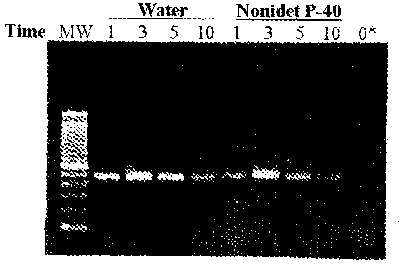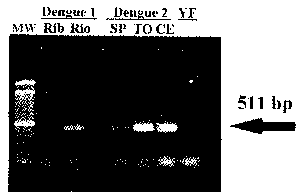We show here a simplified RT-PCR for identification of dengue virus types 1 and 2. Five dengue virus strains, isolated from Brazilian patients, and yellow fever vaccine 17DD as a negative control, were used in this study. C6/36 cells were infected and supernatants were collected after 7 days. The RT-PCR, done in a single reaction vessel, was carried out following a 1/10 dilution of virus in distilled water or in a detergent mixture containing Nonidet P40. The 50 µl assay reaction mixture included 50 pmol of specific primers amplifying a 482 base pair sequence for dengue type 1 and 210 base pair sequence for dengue type 2. In other assays, we used dengue virus consensus primers having maximum sequence similarity to the four serotypes, amplifying a 511 base pair sequence. The reaction mixture also contained 0.1 mM of the four deoxynucleoside triphosphates, 7.5 U of reverse transcriptase, 1U of thermostable Taq DNA polymerase. The mixture was incubated for 5 minutes at 37ºC for reverse transcription followed by 30 cycles of two-step PCR amplification (92ºC for 60 seconds, 53ºC for 60 seconds) with slow temperature increment. The PCR products were subjected to 1.7% agarose gel electrophoresis and visualized by UV light after staining with ethidium bromide solution. Low virus titer around 10 3, 6 TCID50/ml was detected by RT-PCR for dengue type 1. Specific DNA amplification was observed with all the Brazilian dengue strains by using dengue virus consensus primers. As compared to other RT-PCRs, this assay is less laborious, done in a shorter time, and has reduced risk of contamination
Dengue detection; Dengue diagnosis; RT-PCR




